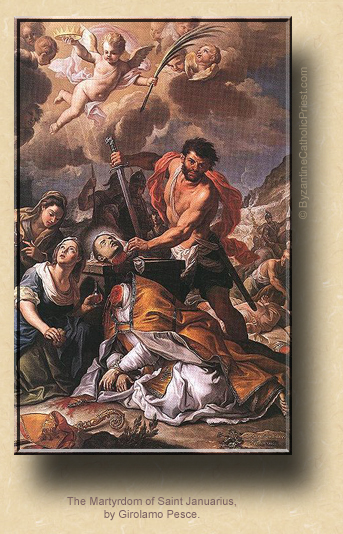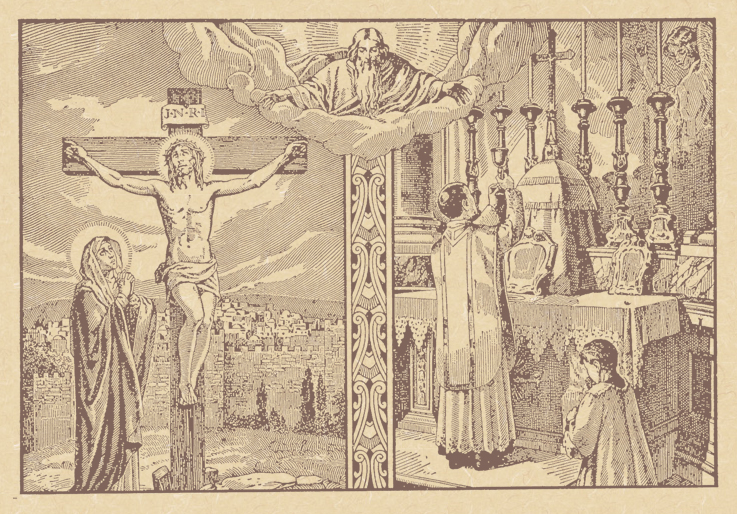Our Lord's Primer on Grace.
The Twenty-Fourth Saturday of Ordinary Time; or, the Memorial of Saint Januarius, Bishop & Martyr.
Lessons from the feria, according to the ordinary form of the Roman Rite:
• I Timothy 6: 13-16.
• Psalm 100: 1-5.
• Luke 8: 4-15.
The Third Class Feast of Saint Januarius, Bishop & Martyr, and His Companions, Martyrs.
First & second lessons from the common, third lesson from the proper, according to the extraordinary form of the Roman Rite:
• Hebrews 10: 32-38.
• Psalm 33: 18-19.
• Matthew 24: 3-13.
The Saturday after the Exaltation of the Holy Cross; and, the Feast of the Holy Martyrs Trophimus, Sabbatius & Dorymedont.
Lessons from the pentecostarion, according to the Ruthenian recension of the Byzantine Rite:
• I Corinthians 1: 26-29.
• John 8: 21-30.
FatherVenditti.com
|
 2:34 PM 9/19/2015 — If memory serves, the last time we looked at the parable in this Gospel lesson we were in this very chapel, displaced by the very same council meetings that are displacing us today. Even so, we should never forget that, even with the Blessed Sacrament removed, a church is still a church. But this is really just a remnant of those confusing post-conciliar days when so much of the ancient patrimony of our Faith was either forgotten or deliberately pushed aside: in this case, the concept of Sacred Space, which became part of the Church's life in the days of Charlemagne, when the Christians began for the first time to offer the Holy Sacrifice of the Mass in buildings specifically built and consecrated for that purpose rather than in private homes or cemetery catacombs. I've always said that a Catholic should be someone who is able to think in centuries rather than for the pragmatism of the moment. That's why history is so important. 2:34 PM 9/19/2015 — If memory serves, the last time we looked at the parable in this Gospel lesson we were in this very chapel, displaced by the very same council meetings that are displacing us today. Even so, we should never forget that, even with the Blessed Sacrament removed, a church is still a church. But this is really just a remnant of those confusing post-conciliar days when so much of the ancient patrimony of our Faith was either forgotten or deliberately pushed aside: in this case, the concept of Sacred Space, which became part of the Church's life in the days of Charlemagne, when the Christians began for the first time to offer the Holy Sacrifice of the Mass in buildings specifically built and consecrated for that purpose rather than in private homes or cemetery catacombs. I've always said that a Catholic should be someone who is able to think in centuries rather than for the pragmatism of the moment. That's why history is so important.
I remember, not long after I had arrived here, I was asked by someone why I didn't conclude the Bidding Prayers—when I chose to do them—with the Hail Mary, as so many other traditionally minded priests do, but my explanation didn't register because that person wasn't able to process the history that I was explaining to him. The simple fact is, there is no missal, liturgicon or sacramentary from any period of history, in either the East or the West, in which the Angelic Salutation ever formed a part of the Eucharistic Sacrifice, and that includes the Roman Missal Third Edition which we are now using. It's the first time in my priesthood that I was ever accused of not loving our Lady, which is kind of unbelievable. But, thankfully, the Bidding Prayers are purely optional, so I diffuse the issue altogether by simply omitting the Bidding Prayers except on Sunday. Injecting a modern practice which has no history behind it into the Mass because one finds it beautiful may satisfy our personal devotion; but, we can't call something traditional if it's not based on tradition. Otherwise, we might as well replace the Kyrie with the Divine Mercy Chaplet and the Creed with the Rosary. It might be beautiful to some people, but it wouldn't be the Mass handed down to us from the Apostles.
But this is off the mark. We should be looking at today's Gospel lesson, which really shouldn't require any explanation given that our our Blessed Lord, in a rare display of candor, explains the parable for us. The sower is Himself, the seed He sows is the word of God,  and the earth into which the seed falls is us; the message of the parable being that the word of God will only take root and bare fruit in us if we are prepared to receive it with a generous and well disposed heart. And our Lord even enumerates some of the things that can prevent that from happening: greed, lust, preoccupation with worldly things, and so forth. and the earth into which the seed falls is us; the message of the parable being that the word of God will only take root and bare fruit in us if we are prepared to receive it with a generous and well disposed heart. And our Lord even enumerates some of the things that can prevent that from happening: greed, lust, preoccupation with worldly things, and so forth.
Last year, when we looked at this parable, we reviewed our basic catechism on how the grace of the Sacraments operates: a person doesn't automatically get into heaven because he has been baptized, he doesn't automatically remain faithful in his marriage simply because he's received a sacrament uniting him to his wife, a priest isn't automatically holy simply because he's been ordained, and even the absolution we receive in confession isn't valid unless it's accompanied by a genuine desire to change. The Sacraments are not magic. A sacrament given to someone without faith is like a seed which is given no water or sunlight. It doesn’t grow just because you put it in the dirt; without these other necessary conditions, it just sits there and rots.
And I'm not telling you anything you don't know; that's why so many of us find ourselves concerned and disturbed about all this talk going around about divorced and remarried people and whether they should be admitted to Holy Communion. It's not going to happen, because it can't. The necessity of being in the State of Grace to receive worthily is divinely revealed teaching; it can't be changed even by the Pope. Yet, you're also smart enough to know that unworthy communions happen all the time, and not always for reasons of sin, but because of a simple lack of faith. You can drag someone into church and make them march up to receive Communion, but if they don’t believe, they receive no grace. The Eucharist is real, certainly; but, the grace the Eucharist promises us does not activate, because there is no faith to feed it.
And, as obvious as all of this is, sometimes it's helpful to remind ourselves of certain things just to avoid the temptation of believing ourselves to be completely alone in our appreciation for sound doctrine. Baptism isn't a welcoming into the community of faith; it's a cleansing of original sin and a restoration of Sanctifying Grace. Confession isn't counseling and emotional reconciliation; it's absolution from our sins. Marriage isn't a celebration of love; it's the sacramental ratification of a covenant between two people and their God, authorizing them to cooperate with Him in the mystery of creation. A funeral is not a form of theatrical grief counseling; it's a prayer to speed the soul on its journey and keep it safe until the final resurrection. And the Blessed Eucharist is not a meal of fellowship; it's the sacrifice of Calvary made present to us through a reenactment of the actions and words of our Lord at the Last Supper. The Sacraments of the Church were not instituted by Christ and given to us as forms of therapy; they are not meant to heal us emotionally, but to save our souls.
Every day the Lord sows His seed in our lives. When we come to Holy Mass, He sows the seed of his grace in His word and in the Holy Mystery of his Body and Blood. Whether that grace does us any good depends entirely on what kind of soil we have provided in our hearts and in our lives. And this is exactly what our Lord is talking about in the parable. The seed is good. The soil is us. And the seed, in order to grow, not only has to fall into good soil, but must then be watered and cultivated with care every day. Growing in our relationship with God is a daily effort. The seed must be watered with prayer and grace, and the plant that grows must be frequently pruned and trimmed with sacrifice and mortification so that it will grow strong and tall.

|

